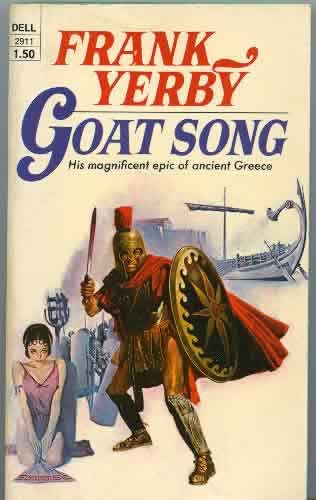Goat Song
by Frank Yerby

Reviewed by Coral
Written in 1967, Frank Yerby's Goat Song is the story of Ariston, a Spartan boy who survives disgrace and slavery to find the life and love he's always wanted.
I think I'm going to have to think up new ways of saying how absolutely horrible a book is, because it seems like I've been reading nothing but bad books for months now. There was just so many things I hated about this book, starting from pretty much the first chapter.
I hated how Ariston and Phryne fall in love with each other in two seconds. They don't even know each other for more than a chapter and I'm supposed to be moved by this great love? I'm supposed to believe they were both willing to give up everything for a person they didn't know for more than a day? When did that become love? When Phryne dies in the second chapter, am I supposed to care? I couldn't believe that Ariston was so torn up about her death because I had nothing invested in the "relationship". Ariston hadn't even been honest with her; that's not a love story.
I hate it when authors write stories about the past when they aren't completely comfortable (and/or familiar) with the subject matter. You can tell, sometimes, when authors are uncomfortable with certain elements about the past because they try to ignore them or gloss over them. Sometimes they even let modern prejudices get in the way, which is what happens in this book. Like when authors are uncomfortable with the concept of polytheism so they write their main characters as skeptics - which happens here too, to a degree. If they're uncomfortable about the aspects of the time they've chosen to explore in writing, maybe they should choose again.
What's worse is the homophobia in this book, more so because it seems completely ridiculous and out of place in a book about ancient Greece. The author even has a character argue that the gods made men and women to be compatible for each other, so that it's a sin for men to lie with men. I mean, did the author even do any research about the gods of ancient Greece? Because at least three had male lovers. Zeus had his Ganymede. Apollo had like 18 male lovers. Heracles had about 15 male lovers. To me, it sounded like the author was letting his own prejudices override the reality of what ancient Greece was like. Plus he called every single man who slept with another man effeminate, or "a maiden at heart" or made them crying wimps. They were Spartan soldiers. Just because they sleep with men it doesn't make them any less a Spartan soldier. Sleeping with each other was a part of the Spartan training process, and Sparta had an incredibly powerful army.
I know some people see the past as a brutal time, and I know that was true to some extent. I mean, I may love reading and researching history, but I try to stay realistic about it, and not gloss over the truth about it. But in some places it seemed like characters were just brutal to be brutal, like the way Phryne was dealt with for example.
The way Ariston's friend Orchomenus talked about marriage seemed unrealistic. Then again, the same is true of almost everyone in the past talking about wanting to marry someone they loved instead of someone that is a good match. Things like that happened all the time in the past, and I hate that there always seems to be a main character bitching about it because the author feels like there should be one. I don't understand why there can never be someone happy with their lot in life unless they're a brute.
Not shocking after the way he talked about the Greek gods, but the author didn't seem to know a lot about the Greek philosophers. He has a Spartan character mention them as an example of Athenian freedoms that Spartan's don't have. Now, while that is true, it was also very true that a lot of these philosophers were very pro-Spartan. They believed that Sparta's way of doing things was better than the democracy Athens had.
Lastly a few minor grips. Alkmena calling her son Ariston, "my lover" is, as I've mentioned before, gross. A Greek could not use the word "catamite" as a description for someone, because catamite is derived from the Roman name for Ganymede, and not around yet in the time the book was set. The punishment Ariston got for his killing spree was ridiculous, considering he killed fellow Spartan soldiers. He should have been executed.
Grade: F